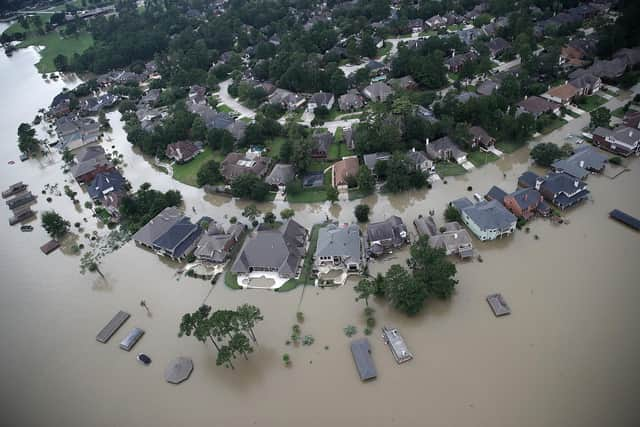COP26: The economic case for tackling climate change is stronger than ever but flawed thinking is leading some countries astray – Professor Lord Nicholas Stern
The drive for net-zero emissions of carbon dioxide and other greenhouse gases, and efforts to make ourselves more resilient to those impacts of climate change that cannot now be avoided, will create the new economic development and growth story for the 21st century.
With many countries around the world, and a rising number of companies and cities, committing to reach net-zero emissions by the middle of this century, the next ten years in particular will be full of innovation and creativity, with new jobs, opportunities and markets.
Advertisement
Hide AdAdvertisement
Hide AdAs the age of fossil fuels draws to a rapid close, we have the chance to replace it with an era of greater sustainability, inclusivity and resilience. We can choose a global economy that is cleaner, smarter and more efficient.
My review of the economics of climate change, which was published by the UK government 15 years ago this week, concluded that the costs of inaction on climate change would be much bigger than the size of investments required for the world to decarbonise.
Since then, global temperature has continued to climb, and is now more than one degree Celsius higher than it was before industrialisation. Scientists have shown us that the risks of climate change are even greater than we knew at the time.
We have seen across the world the growing loss and damage from rising sea levels and increases in the intensity of extreme weather events, including tropical storms, wildfires, heatwaves, heavy downpours and droughts.


We have also seen that many alternatives to fossil fuels can be developed and deployed even more quickly than anticipated. This has involved learning by doing across businesses, and by taking advantage of economies of scale, the costs of technologies such as solar photovoltaics and wind turbines have reduced rapidly and substantially.
As a result, in many parts of the world, zero-carbon electricity is now cheaper than fossil fuel power. With advances in battery technology and mass production processes, zero-emissions vehicles will soon be cheaper to buy and run than those with internal combustion engines. From buildings to transport and agriculture, zero-carbon is proving better and cheaper than high-carbon.
And of course there are other economic benefits from the transition to net-zero emissions, such as a reduction in the vast damage to lives and livelihoods from local air pollution.
According to the World Health Organisation, the lives of about seven million people worldwide are cut short every year by air pollution from the burning of dung, wood and fossil fuels. In countries such as China and India, air pollution is knocking several percentage points off annual economic output.


Advertisement
Hide AdAdvertisement
Hide AdIndeed, the transition to zero-carbon growth can help to create cities where it will be easier to move, breathe and work. In many countries, cities are centres of economic activity, so the higher productivity resulting from the shift away from dirty and inefficient business processes will boost national growth rates.
Despite this growing understanding of the immense risks of climate change, and the tremendous economic benefits of a transition to zero-carbon growth, annual global emissions of greenhouse gases have not declined but instead increased by about 20 per cent over the past 15 years.
So what has gone wrong? Sadly, too many economists and economic decision-makers have been labouring under the misconception that climate action requires a trade-off with development and growth.
Flawed economic analyses have failed to capture the enormous risks created by climate change, and severely overestimated the difficulties of replacing fossil fuels with cleaner alternatives.


But it should now be abundantly clear that these economic assessments have been wrong.
Indeed many countries have now started to take climate action while also growing. For instance, the UK has cut its annual emissions of greenhouse gases by 44 per cent since 1990, while its economy has expanded by about 78 per cent.
This has mainly been achieved through improvements in energy efficiency and switching from coal to natural gas and renewables for electricity generation.
Last week, the government published its net-zero strategy, outlining how the UK could effectively end its contribution to rising greenhouse gas concentrations by 2050.
Advertisement
Hide AdAdvertisement
Hide AdIn its net-zero review, published alongside the strategy, the Treasury concluded: “UK climate action could provide a boost to the economy; the required investment could contribute to growth.”
This boost will also help the UK’s economy recover from the severe effects of the Covid-19 pandemic.
As I pointed out in my report on the recovery which was commissioned by the Prime Minister ahead of the G7 summit in Carbis Bay, Cornwall, earlier this year, an investment-led recovery offers the best chance of placing all countries on a sustainable path towards higher living standards, greater prosperity and improved well-being.
For the G7 countries, an increase in annual investment equivalent to two per cent of GDP over the next decade would drive growth and accelerate the transition to a zero-carbon and climate-resilient economy.
The rich countries should also help to provide the finance for the investments that developing countries will have to make to pursue a new form of sustainable and resilient development. Not only is this the right thing to do, it is the best way to ensure we all gain from a better climate.
The summit in Glasgow is a chance not only for the world to overcome the threat of global climate change, but also to adopt a new and attractive form of economic development and growth that delivers greater prosperity for all.
Professor Lord Nicholas Stern is chair of the Grantham Research Institute on Climate Change and the Environment and the ESRC Centre for Climate Change Economics and Policy at the London School of Economics and Political Science
A message from the Editor:
Thank you for reading this article. We're more reliant on your support than ever as the shift in consumer habits brought about by coronavirus impacts our advertisers.
If you haven't already, please consider supporting our trusted, fact-checked journalism by taking out a digital subscription.
Comments
Want to join the conversation? Please or to comment on this article.
